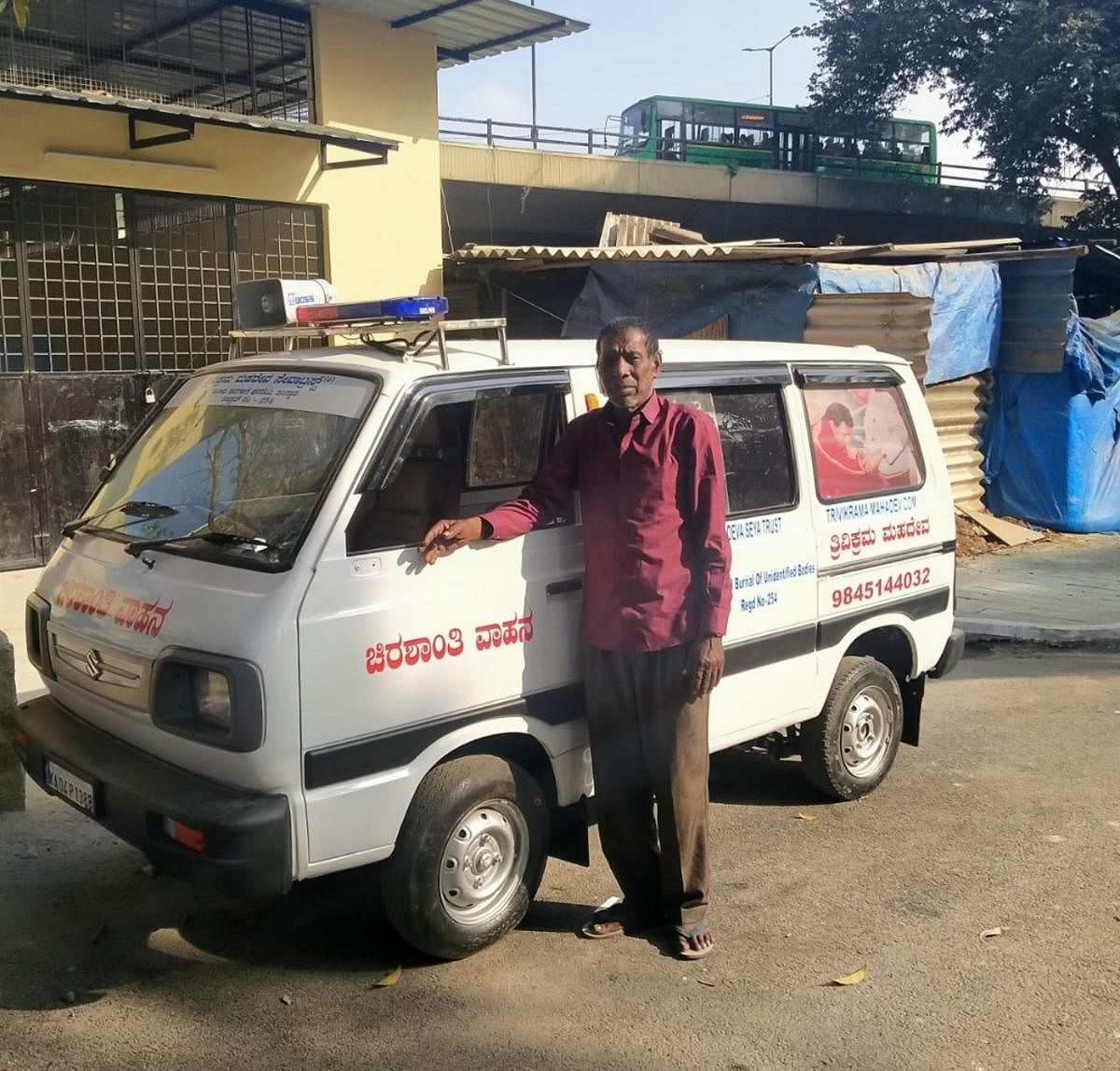
'Trivikrama’ Mahadeva, who gave decent funerals to thousands of orphaned bodies, was laid to rest in Bengaluru last Thursday. He was 60.
For years, he drank tea all day and smoked countless beedis, and had developed lung cancer, says Mahadeva’s son Praveen Kumar.
Praveen now runs the Trivikrama Mahadeva Seva Trust in Rajarajeshwari Nagar, where he continues his work. The trust was set up in 2018.
“My father used to believe that everyone deserves a decent burial. He was on the job for more than 40 years, and cremated more than 88,000 people,” says the 35-year-old Praveen. Along with sons Praveen and Kiran, they have cremated 1.5 lakh people.
Started at nine
Mahadeva brought his mother from Hanchipura, Nanjangud taluk, Mysuru, to Victoria Hospital in Bengaluru in 1971. A few days later, she died, and was cremated by an elderly man called Krishna, whom Mahadeva called ‘thatha’.
“He then raised my father in Bengaluru, and he began to assist ‘thatha’ to give decent funerals to abandoned bodies,” says Praveen. When Krishna fell ill, Mahadeva stepped into his shoes.
“My father moved bodies for burial on a stretcher initially. He later bought a tonga (horse cart),” says Praveen. The young Mahadeva wasn’t able to find a wife easily because of the nature of his work. “He was finally married in 1986,” says Praveen.
In 1995, Mahadeva was called ‘Trivikrama’ Mahadeva in an article in ‘Sudha’ magazine, and soon after, he was featured on a TV channel.
“He was given Rs 25,000 by the mayor of Bengaluru, with which he bought an auto. My father was later given many awards, such as the Rajyotsava Award, Kempegowda Award, and the first Namma Bengaluru Award in 2008,” says the proud son. Mahadeva was felicitated by former-president APJ Abdul Kalam in 2004, and was also awarded the Godfrey Phillips Bravery Award for Social Acts of Courage in 2006.
“None in the family ever questioned his choice of work and the hours he spent outside. We considered this ‘seva’ (service) and were proud,” he says.
Mahadeva was bedridden for years and stopped doing funerals but was a continuous inspiration, Praveen says.
Father’s footsteps
Praveen, an MSW graduate, continues in his father’s footsteps. “I used to accompany my father as a child when he was moving bodies for funerals. I would notice that my father would never flinch, even if the body was decomposed,” he says.
From the bodies of day-old babies to those of infirm, elderly people, Mahadeva had seen everything. Praveen would cry when he saw such funerals but as he grew older, realised someone had to do the work.
He moved body of Sivarasan, implicated in Rajiv assassination
In 1983, when the Gangaram building collapsed in Bengaluru, Mahadeva transported and cremated the bodies of 18 labourers in a day. “In 1991, with police security, he transported the body of Sivarasan, one of the people involved in the Rajiv Gandhi assassination. Sivarasan was killed in police fire, and the body was to be taken to the crematorium,” says Praveen.
A retired police sub-inspector and a doctor were among those for whom Mahadeva conducted funerals, says Praveen.
Mahadeva is survived by his wife Pushpalatha and four children — Praveen Kumar (35), Sonu M (24), Arpita M (22) and Kiran Kumar (20).
On screen
A Kannada movie directed by K Parthasarathi called ‘Samskaravantha’ was based on the life and times of Mahadeva. The late Kashi acted as Mahadeva.
Why are bodies orphaned?
Many accident victims, especially on railway tracks, are not identified, and no one turns up to claim the bodies or perform the last rites.
Mahadeva would turn up and take care of such bodies, giving them a decent burial. Government hospitals often called Mahadeva to take away bodies with no claimants. Mahadeva lived a simple life in a house in Rajarajeswari Nagar and sometimes received help as donations from philanthropic individuals, which helped him raise his four children.